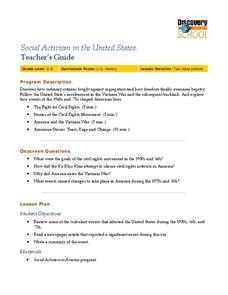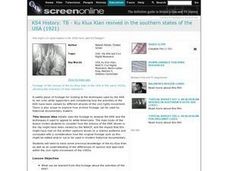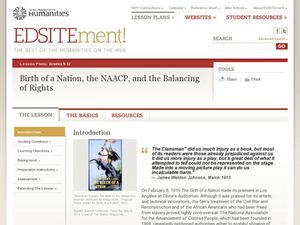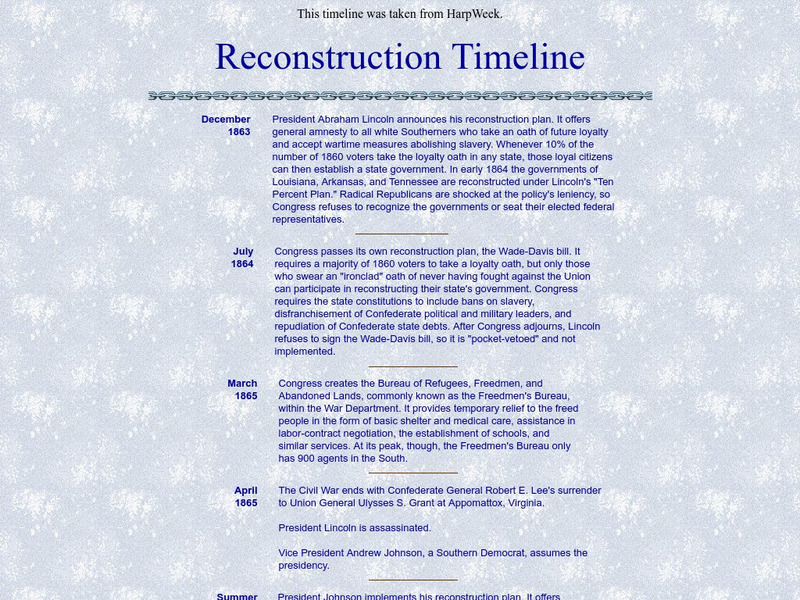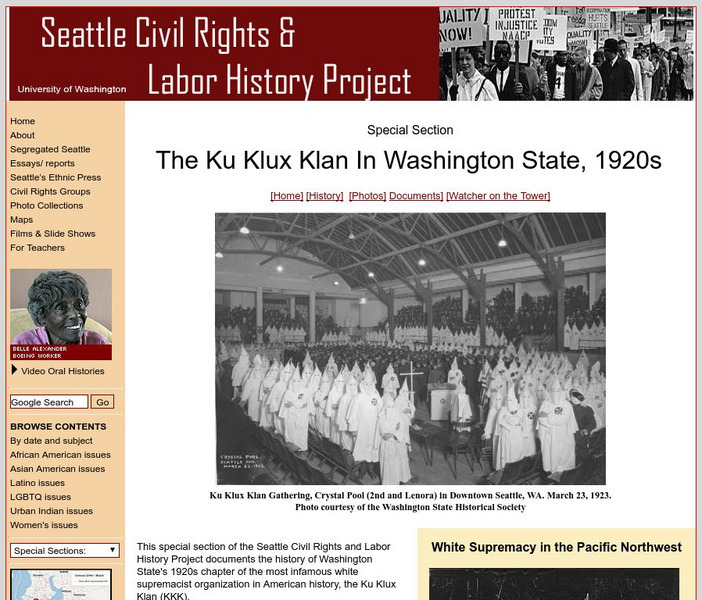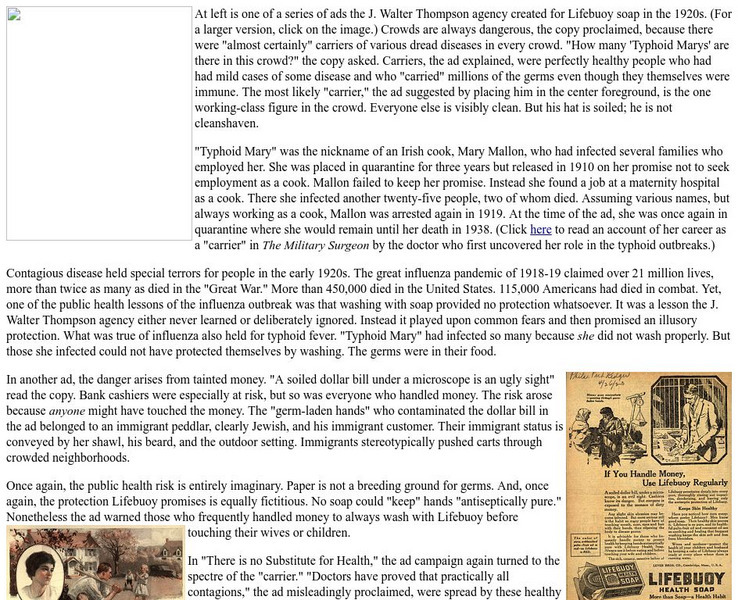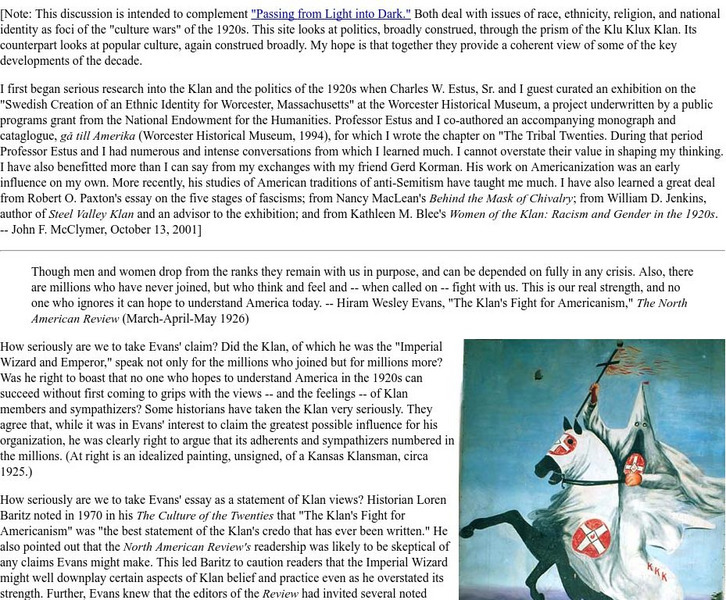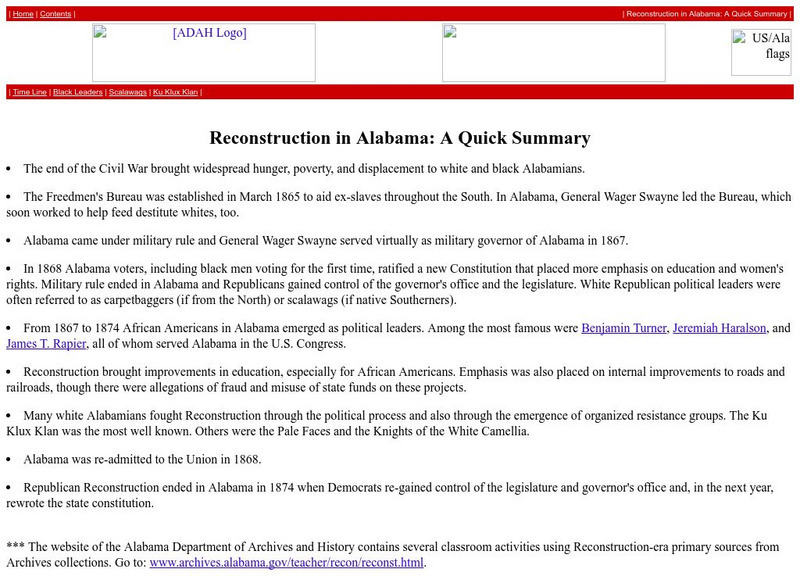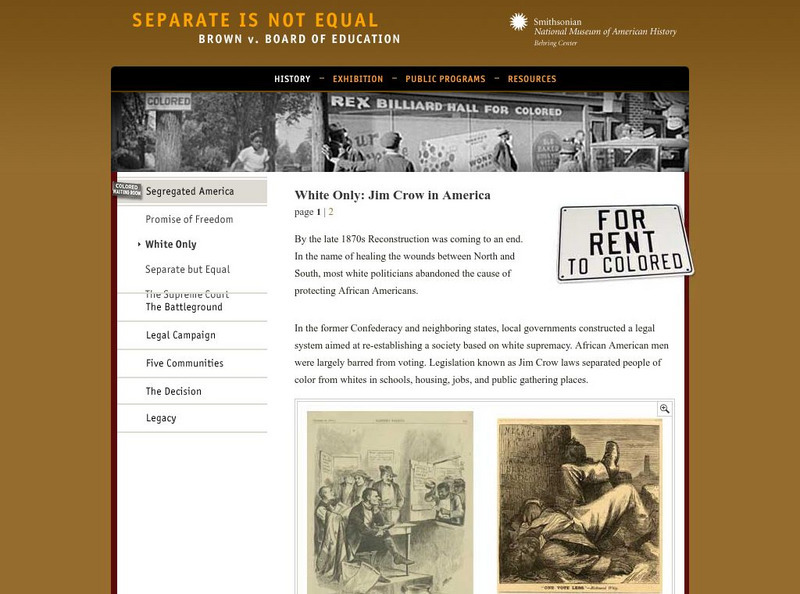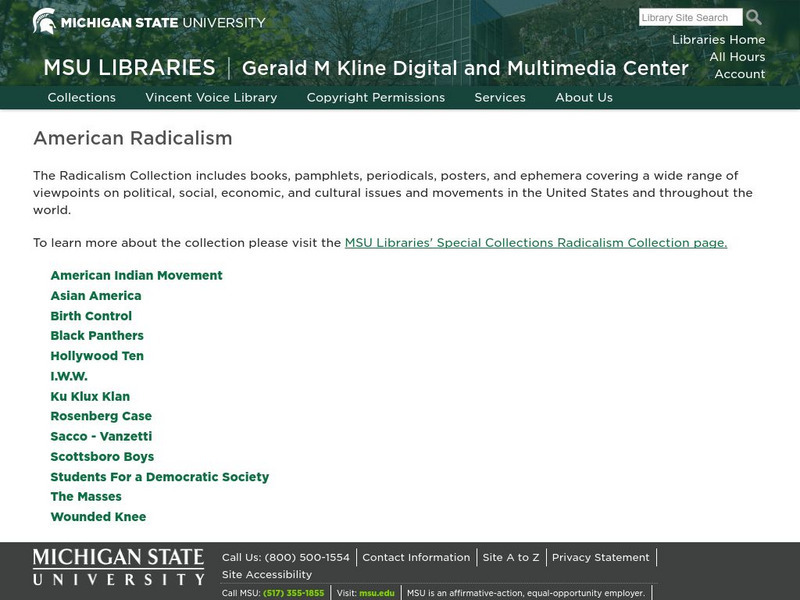Curated OER
Social Activism in the United States
Seventh graders explore the goals of the Civil Rights Movement of the 1950s and 1960s. In this US History lesson, 7th graders read a newspaper article that reported a significant event during this era. Students write a...
Curated OER
USA: the KKK and Civil Rights Movement
High schoolers view film footage of the Ku Klux Klan in the U.S. in the early 1920s and examine how the actions of the KKK have been viewed by different strands of the civil rights movement. They watch the film and answer discussion...
Curated OER
A Closer Look at the Klan
Fourth graders learn vocabulary, answer discussion questions, complete writing assignments, and identify symbols connected to the Ku Klux Klan. In this Ku Klux Klan lesson plan, 4th graders also go on a field trip to the Thomas Hart...
Curated OER
Ku Klux Klan
Students discuss, write, and identify symbols of the activities of the Ku Klux Klan in the 1920's in Indiana. In this Ku Klux Klan lesson plan, students also take a field trip to view the Thomas Hart Benton Murals at Indiana University.
Curated OER
Birth of a Nation, the NAACP, and the Balancing of Rights
Eleventh graders analyze primary sources. In this US History lesson, 11th graders interpret written information. Students evaluate arguments and draw conclusions. Students develop and defend a position.
Curated OER
The Fears of Black Americans during and after Reconstruction
In this segregation study guide worksheet, students discover details regarding the fears of Black Americans following Reconstruction. Students read 3 sections of information and examine photographs.
Curated OER
The Ku Klux Klan In Indiana: 1920-1930
Pupils examine the role of the Ku Klux Klan in Indiana from 1920-1930. They read an informational handout, define key vocabulary terms, conduct an interview with a parent or grandparent, write a family history, and role-play a scenario.
National Humanities Center
National Humanities Center: America in Class: America in the 1920s: Divisions: Ku Klux Klan
The National Humanities Center presents collections of primary resources compatible with the Common Core State Standards - historical documents, literary texts, and works of art - thematically organized with notes and discussion...
Digital History
Digital History: The Ending of Reconstruction
In the 1870's, violent opposition in the South and the North's retreat from its commitment to equality, resulted in the end of Reconstruction. By 1876, the nation was prepared to abandon its commitment to equality for all citizens...
Davidson College
Prima: Supreme Court's Response to Nativism in the 1920s
This article from a scholarly magazine from Davidson College outlines the legislation proposed and often passed that reflected nativist tenets, especially in state legislatures. Read how decisions of the Supreme Court found most of this...
Mount Holyoke College
Mt. Holyoke: Reconstruction Timeline
Here's a concise timeline that highlights the important facets of reconstruction from the announcement of Abraham Lincoln's reconstruction plans to the end of reconstruction at the election of Rutherford B. Hayes.
University of Washington
Seattle Civil Rights Project: Ku Klux Klan in Washington State, 1920s
Find extensive essays, photographs, articles from newspapers, and documents that trace the rise of the Ku Klux Klan in Washington State in the 1920s. Be sure to look through this entile site to see the anti-African American,...
University of Missouri
Famous Trials: The Sweet Trials
The KKK membership was on the rise in Detroit in the 20s. An angry mob gathers at the home of an African-American doctor and shots ring out from the upstairs. Investigate the trial through transcripts and eye witness accounts.
PBS
Pbs: American Experience: Interview With John Hope Franklin Discussing the Kkk
Historian John Hope Franklin discusses the KKK's beginnings and opposition to education for the freedmen in the period after the Civil War.
PBS
Pbs: The Legacy of Harry T. Moore
An "almost forgotten" hero of the Civil Rights Movement is brought to light in this PBS documentary. Moore's biography and legacy are provided.
Other
Contagion: The Spread of Eugenics Throughout American Popular Culture in the 20s
A comprehensive look at the theory of eugenics, the pseudo-scientific idea that fed into the nativists' search for the "superior" American. This article explains how companies used this theory to sell their products.
Other
For Many, One: The Kkk in the 1920s
This is an in-depth look at the Ku Klux Klan in the United States in the 1920s. Find out why there was a resurgence of this hateful group, read about their philosophy, and how their views were influenced by the events of the Jazz Age.
Other
Alabama.gov: Reconstruction
Learn facts about life in the state of Alabama after the Civil War.
PBS
Pbs: American Experience: Fatal Flood
This resource is a companion site to a documentary about a major flooding of the Mississippi River in 1927, where in Greenville, Mississippi, efforts to contain the river pitted the majority black population against an aristocratic...
Other
University of Western Georgia: Reconstruction in the South
An excellent distillation of the many issues addressed in the Reconstruction period in the South in the twelve years after the end of the Civil War.
Smithsonian Institution
National Museum of American History: Separate Is Not Equal: White Only
This section from the Smithsonian Institution's National Museum of American History's exhibition Separate Is Not Equal: Brown v. Board of Education gives the history of Jim Crow laws and how they affected not only the voting rights of...
Michigan State University
Michigan State University: Msu Libraries: American Radicalism
The American Radicalism Collection holds over 17,000 items. It includes books, pamphlets, periodicals, posters, and ephemeral material covering a wide range of viewpoints on political, social, and economic issues in America. The emphasis...
OpenStax
Open Stax: Jazz Age: Redefining the Nation 1919 1929: Transformation and Backlash
Examines the role nativism played in 1920s America, the resurgence of the Ku Klux Klan, the disconnect between urban and rural lifestyles and values, and the fractious debate over evolution that was highlighted in the Scopes trial.
OpenStax
Open Stax: 1945 1960: African American Struggle for Civil Rights
Examines how Presidents Truman and Eisenhower dealt with the civil rights movement, the steps taken by African Americans to combat discrimination and segregation, and the reaction of white people in the South to the civil rights...


